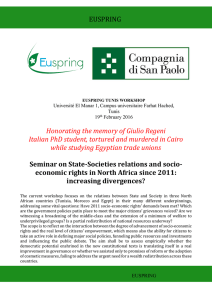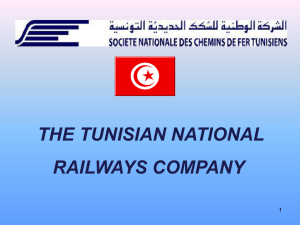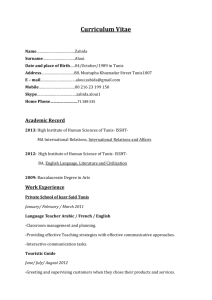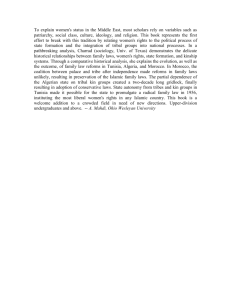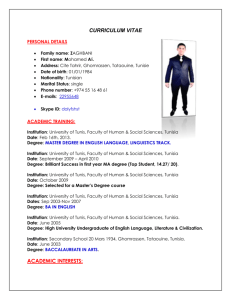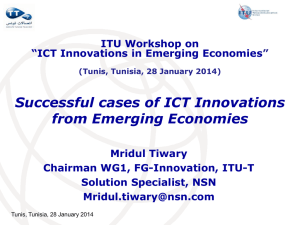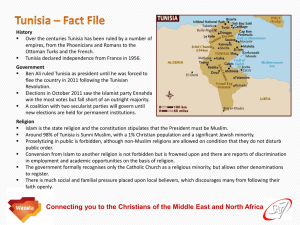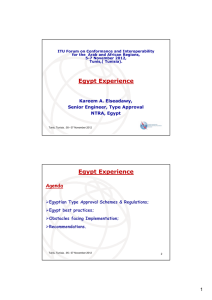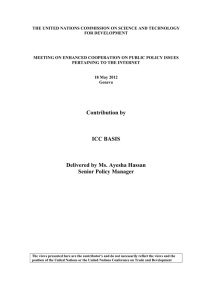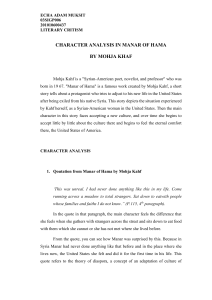State-Society Relations in North Africa Increasing Divergences? Conference Report
advertisement
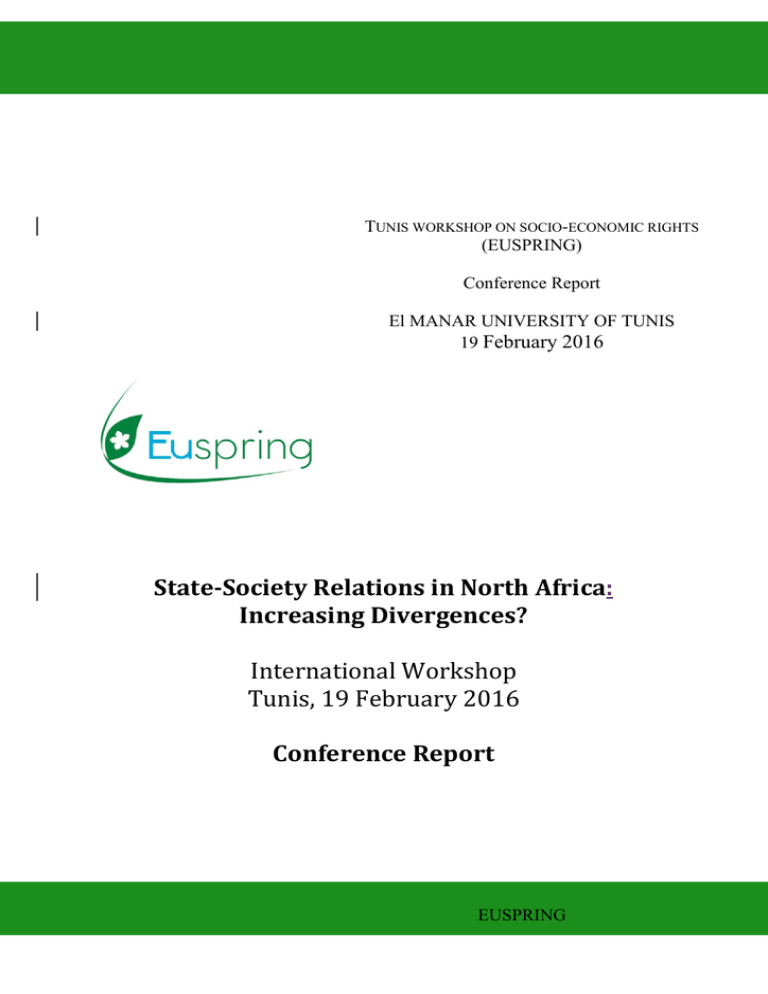
TUNIS WORKSHOP ON SOCIO-ECONOMIC RIGHTS (EUSPRING) Conference Report El MANAR UNIVERSITY OF TUNIS 19 February 2016 State-Society Relations in North Africa: Increasing Divergences? International Workshop Tunis, 19 February 2016 Conference Report EUSPRING CONFERENCE REPORT This event explored the relations between state and society in three North African countries (Tunisia, Egypt and Morocco), with a special focus on the socio-economic dimension and the challenge of combining strength, democracy and prosperity. Five years after the Arab uprisings, the conference speakers empirically assessed whether the democratic potential enshrined in the new constitutional texts has translated into the real empowerment of citizenship and improvement in governance. The second part of the conference inquired to what extent the socio-economic demands at the heart of the 2011 uprisings have been met. The workshop was organized in Tunis on 19 February 2016, within the framework of the EU-Spring Project by the University of Naples L'Orientale (Italy), in cooperation with the University of Tunis El Manar, the Observatoire Tunisien des Droits de l'Homme and Compagnia di San Paolo. The sessions were open to the public and the media, and brought together experts from both academia and civil society to reflect on current developments in three different scenarios, and to question continuities in terms of government policies and protest dynamics. The conference addressed key issues concerning North African states’ weaknesses and strengths, as well as the politics of exclusion and repression. 1. STATE-SOCIETY IN NORTH AFRICA: WHAT IS NEW? The event began with opening remarks by Ruth Hanau Santini, coordinator of the EU-Spring project (University of Naples L’Orientale), who stressed the importance of rethinking the interaction between state and society in the context of failure of the “old” social contract and uncertain economic and political frameworks. Hanau Santini underlined the importance of analytical reflections on the nature of the Arab state, in line with seminal works by Migdal, Hudson, Ayubi and others, and the necessity to unpack state-society relations by focusing on power politics and acts of citizenship as mobilization including but also subsuming resistance. Several examples of successful instances of societal demands that have been incorporated into state policies in the post-2011 Tunisian context were formulated, while the more problematic nature of continuous social engagement in the Moroccan context and even more so, in the Egyptian context, were pointed out as signalling divergent statesociety trajectories in the region. The discussion later continued with interactive panel discussions and presentations. Opening the first session – chaired by Prof. Mohammed Kerrou (University of Tunis El Manar) – Prof. Hamadi Redissi (Observatoire Tunisien de la Transition Démocratique) placed a focus on the conceptualization of the state's weaknesses and strengths. Redissi argued that, although Tunisia seems to be the only country that has managed to preserve state institutions and achieve a democratic transition, some indicators show that the uncertain character of this process weakened the state. Historically, the Tunisian state has been a powerful “organic” state, able to penetrate society and display its authority without any notable objection from it (the German-inspired maachstaat: placing itself above its citizens and respectful of objective not subjective rights). This state later transformed into a fierce police state that replaced passive loyalty by “forzanuda”, but which collapsed on 14 January 2011. As a fledgling democracy, Tunisia is now witnessing the disclosure of a new “public EUSPRING space”, in which different and opposing political forces openly debate public issues. This represents one of the major and lasting outcomes of the Arab Spring that occurred five years ago. However, the country faces a dilemma regarding the challenge of being powerful and democratic at the same time, and maintaining both the state structure and a system of values. In fact, deteriorating economic conditions, security chaos, the poor quality of public utilities and services and still being marked by a lack of discipline and increasing corruption all serve as major challenges to the state's capability and power. Redissi concluded by underlining that the fact that in Tunisia, democracy and prosperity are not yet working together, a common feature of many democratic transition processes. However, this is not in itself a telling issue; the real problem will be if this initial instability takes on a more permanent character. Mohammed El Aagaty (Arab Forum for Alternatives) reflected on the persistence of a “deep state” willing to maintain its privileges in Egypt. The highly hierarchical and vertical structure that the Egyptian state inherited from Nasser's revolution imposed the role of the army and the middle class, and displays itself in the form of a “neo-authoritarian” state that narrowed the scope for civil society and confrontation. Although social unrest has spread in parallel with the growth of corruption, and civil society continues to be dynamic and stage many demonstrations and strikes despite heavy repression, the situation has progressively deteriorated. Closing the first panel, Prof. Maati Monjib (University Mohammed V of Rabat) remarked that neither the state nor the government is strong in Morocco and that behind the scenes, the Makhzen (or “deep state” evolving around the Royal family) still retains control. He noted that the socioeconomic dimensions of the protests provided a major threat to the stability and security of the Moroccan regime, much more so than other political or human rights movements. In this regard, some measures have been taken, following increasing pressure from civil society and the ‘street’. However, notwithstanding an initial emergence and expansion of the public space, a soft counter-revolution began in Morocco in 2013. There are three elements to this: the recovery of power by the traditional apparatus and establishment; (2) a significant decrease in the number of protests; (3) the cooptation by the central power of newspapers and independent outlets, and the confiscation of open space hosting public debates. 2. FIGHTING FOR ECONOMIC RIGHTS IN TUNISIA, MOROCCO AND EGYPT The second session, chaired by Prof. Zouhour Kourda (University of Tunis El Manar), took an indepth view of socio-economic rights and their respective implementation – or lack thereof – in all of the three countries. Dr. Asma Nouira (University of Tunis El Manar) reiterated that the political slogans of dignity raised by the Jasmine Revolution immediately turned into socio-economic demands. Nouira focused her attention on the permanent existence of a broad informal economy, rising unemployment and the fragile pro-work policies taken to date. She stressed the problem of the informal economy as a phenomenon involving mainly women and youth, and representing a high percentage of the GDP (ranging from 38% to 53%). After 2011, Tunisia witnessed an increase in its unemployment rate, characterized by strong regional disparities, with southern and interior regions strongly affected. Considering this, urgent solutions need to be taken by the government, such as promoting an EUSPRING entrepreneurial culture able to attract foreign investments and creating closer links between university careers and job opportunities, as well as rethinking existing laws in order to encourage formal economic activities over informal ones. On the other hand, Prof. Hafidha Chékir (University of Tunis El Manar) linked the status of women to the broader issue of state empowerment. According to the speaker, notwithstanding the vital role that women played during the 2011 uprisings, they have later been marginalized. Their rights and role in society are being questioned, thus challenging the idea of a modern state. Once again, the effectiveness of the principles enshrined in the new Tunisian Constitution is strictly related to the issuing of implementation laws, such as the revision of the Code of Public Office. The latter is still missing: altogether, considering the laws regulating the labour market, very few effective measures, if any, have been put in place to guarantee women fair access to jobs, protect them during maternity or to protect them from sexual harassment. The video presentation of Dr. Dina Mansour (Orient Institut Beirut) pointed out that in post-Arab Spring Egypt, poverty, social justice and inequalities remain unaddressed, and socio-economic exclusion undermines the enjoyment of basic citizenship rights. The long-standing path from Sadat's “open door policy” to Mubarak's rentier Egypt, led to aggressive privatization, high levels of corruption, monopolies and major social inequalities. In stark contrast with exemplary macroeconomic indicators, poverty has significantly increased during the past decades, in a more multidimensional, multifaceted and intergenerational manner. To date, chronic symptoms have continued, fuelling an increasing disconnection between state and society. On the one hand, there has also been political repression and an ever more centralized state, the retreat of the state, and the parallel transfer to civil society and religious charities of the provision of fundamental social services dealing with the poor and public needs. Mansour finally suggested that this gap might be reduced, among other alternatives, by creating a stable environment for investment, rationalizing public spending and increasing the minimum wage. Finally, Dr. Claudia De Martino (University of Naples L'Orientale) claimed that the dominant political and economic model in the Maghreb, the so called “authoritarian bargain”, is collapsing and Morocco now faces conflicting needs: the importance to reform the old system while reducing state bureaucracy and granting socio-economic rights while boosting state resources. In this regard, it is worth noting that the 2011 Constitution does not represent a new social contract, primarily because it had been a top-down process without any forms of consultation with civil society; furthermore, the royal authority has never been contested, either by the PJD, or by the 20 February Movement. On the contrary, several measures have been adopted in order to criminalize opponents, whether Islamists, civil activists or those from the leftist wing. Regarding socio-economic rights, the Makhzen promised much but has to date delivered little. Major reforms are forthcoming, such as those pertaining to universal health care, exceptional public schools, the introduction of a small unemployment wage, as well as the decentralization process, which will confer additional powers to elected regional councils. However, despite these grandiloquent titles, practical implementation lags behind. In brief, while Morocco is still being portrayed as a country involved in gradual political and economic reforms in the context of political and economic opening (and a World Bank’s “bon élève”), five years later, the state's 2011 promises are yet to be implemented. After opening the debate to the public and a lively Q&A session following the presentations, Dr. Asma Nouira conveyed her gratitude to all participants, particularly session moderators and panelists. She extended her thanks to the local partners and the audience, expressing her satisfaction with the interactive nature of the discussions. EUSPRING
